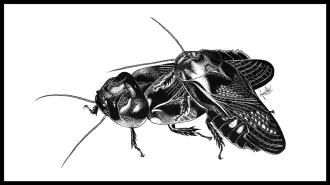From Seattle, at the American Association for the Advancement of Science Annual Meeting
Wild dogs that haven’t lived with people for 5,000 years share little of the capacity of their domesticated cousins for interpreting human gestures. The limited comprehension of New Guinea singing dogs suggests that household canines progressively evolved the understanding of cues from people over the long history of the two species’ domestic partnership, according to Brian Hare of the Max Planck Institute in Leipzig, Germany.
Domestic dogs consistently outperform wolves on tests in which they must rely on a trainer’s motions to lead them to hidden food (SN: 11/23/02, p. 324: Dog Sense: Domestication gave canines innate insight into human gestures). That indicates that reading gestures evolved in dogs after they were domesticated from wolves more than 10,000 years ago, said Hare, who conducted both these tests and his latest research at Harvard University.
Following the earlier finding, Hare subjected New Guinea singing dogs to the same test and found that they performed about as poorly as wolves did. The singing dogs descended from tame dogs that followed Stone Age people to New Guinea. Being feral for millennia, however, they haven’t experienced the full dose of domestication that shaped cognition in other dog breeds, Hare said.






